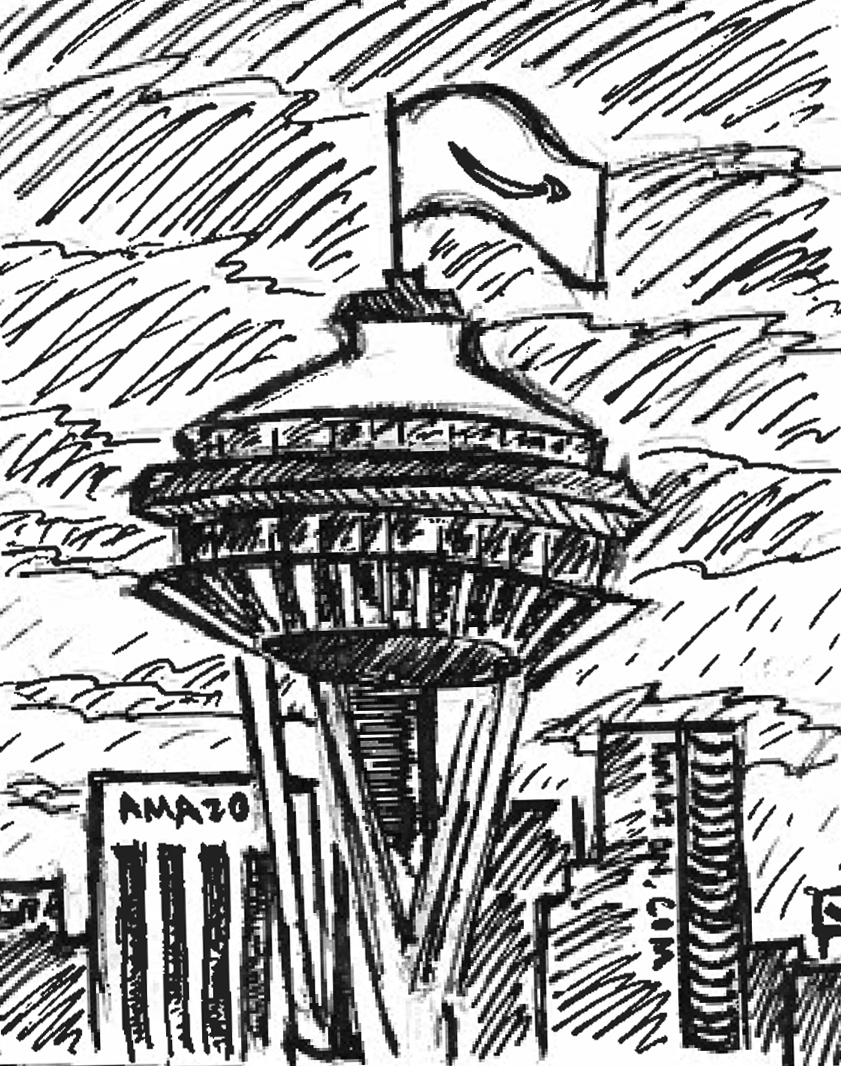Amazon’s continuous growth gentrifies Seattle and deteriorates its authenticity
Tess Petrillo, News Editor
Originally published October 25, 2019
Peter Brown
Have you been spending hours in traffic trying to get home? Noticed another beloved building being torn down to make room for new apartments? Wondering why your rent keeps getting raised? Jeff Bezos calls it expansion.
In the past decade Bezos has graciously welcomed over 35,000 new members to the Seattle area. Employing the most people of any business in Seattle and owning almost 20% of Seattle office real estate has given Amazon the ultimate economic control over Seattle.
Projecting to bring 10,000 new workers into the metro area while simultaneously reaching a total of 12 million square feet of office space by 2022, the beast is only going to continue to grow.
With the expansion of Amazon, the city has no choice but to tailor itself to the business of Amazon employees.
Business Insider reporter Harrison Jacobs writes about the restaurants and food trucks located within the Amazon campus that are booming with business, but only during lunch time and only if they are trendy.
Since the campus becomes almost deserted when the work hour ends, restaurants have had trouble affording to stay open through the dinner hours.
Not only that, restaurants that don’t conform to what Jacobs calls “Silicon Valley trends” such as overpriced ramen, poke or acai bowls, often do not appeal to the Amazon workers and are run out of business.
Inevitably, these trends have contaminated Seattle’s foundation of cheap food culture of the 90s and early 2000s. One dollar pizza slices and cheap coffee are what fed the starving artists that founded what Seattle is, or what it was.
Even restaurants who don’t necessarily conform to the new trends need to increase their prices to stay in business. The only semi-affordable place within walking distance from the school is Tony’s, and even that could be considered overpriced for teriyaki.
Amazon’s effect on Seattle has become so drastic that it affects where we go out to eat at lunch. If Dick’s is torn down, Seattle won’t be Seattle anymore.
Through this process of creating a more appealing environment to the Amazon employees and the company itself, Seattle has been losing its charm and authenticity. This means historic buildings and even gardens are sold into development for new office space and housing.
Most recently, the Ballard P-Patch, a community garden that hosts art showcases and donates over 1300 pounds of produce to the Ballard Food Bank annually, is being threatened to be developed into town houses.
Amazon is not just affecting Seattle’s food culture, but the overall architecture as well.
Before Amazon came to South Lake Union, it was a world of warehouses and industrial buildings. Now, it is completely transformed with the arrival of Amazon’s first office buildings
Along with the continuous expansion of office space, the arrival of new Amazon recruits to Seattle has acted as a catalyst for the never ending construction all over the city.
New people means a need for new housing, which means more buildings coming down to make room for apartments and condos. Also aiding in the conversion from Seattle’s authentic Northwestern character to Amazon’s sleeker futuristic aesthetic.
The new housing primarily consists of boxy condos and apartments scattered throughout the city. Even with the building of all this new housing, Seattle’s prices continue to rise.
The cost to rent an apartment in downtown has averaged out to about $2,400 a month, meaning that the average resident would have to be making $96,000 a year to afford it. According to Glassdoor, the average Amazon worker makes $110,000 a year.
So not only has the restaurant business attempted to make itself more appealing to Amazon, but seemingly the real estate market as well.
As the price of housing continues to rise, people who can’t afford to live in Seattle are forced to move to a cheaper area, leaving more space for the Amazon workers to settle in.
According to Amazon’s current workforce data, 58.3% of the workers are minorities and 38.9% of the workers are white. While this makes Amazon appear diverse on paper, the statistics they don’t put out into the world show that the company is just as discriminatory as any other tech company.
Although white people do not make up the majority of the Amazon workforce, as of 2015, 64% of the workers with high paying executive, technical and administrative jobs at Amazon were white and 23% percent of the workers were Asian. The diversity laid in the number of low paying warehouses throughout the country, where about 24% of the employees were African American and 12% were Hispanic.
Assuming that the statistics have remained somewhat constant, this means that the ever growing population of Amazon employees is an ever growing population of white men. Seattle was already white, Amazon seems to only be making it whiter.
Does all this destruction and conquering of an entire city come with a reasonable cost? Apparently not.
This last year Amazon paid an astounding zero dollars in federal taxes while gaining over $11 billion in profit.
While Donald Trump sent out an enraged tweet commenting on Amazon’s continuously declining state taxes, Amazon’s ability to avoid paying taxes is actually due to the Trump Administration’s implementation of “corporate friendly tax-cuts.”
For the price of annexing our city, Amazon has made a $128 million 2018 federal income tax rebate, making it’s tax rate -1%.
Amazon has chosen Seattle to be its home, it is not leaving and neither will the effect that it has left on the city.

























